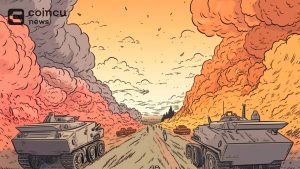Biological evolution should provide information about how people shape markets
If the global COVID-19 pandemic taught humanity anything, it taught humanity that humans are just as dependent on their fellow human beings as honeybees or ants are. Scientists, academics, pharmaceutical managers, philanthropists, and government agencies have worked together to launch a vaccine program that is breaking all records for speed and effectiveness. All of these roles are necessary for the effort – neither can be successful without the other.
This is a clear example of what I consider to be the main advantage of human society: the division of labor makes humanity greater than the sum of its parts. There are a lot of more obscene examples. As I write this, I am using software that I did not create on my computer that I have never been able to produce, and everything is electrically powered that I have neither discovered nor developed.
My background in medicine and biology has given me unique insights into the interrelationships of complex systems, and my years in retail technology have taught me a lot about market design. Both reinforce the belief that specialization is as important to economic success as it is to biological health.
Like a natural ecosystem, a marketplace contains millions and millions of individual actors who operate and interact. Taken together, these various actions take the form of a superorganism whose unique properties and behaviors can be observed and predicted by extrapolation.
Most economists agree with Adam Smith that the economic growth of the modern world is entirely due to the cumulative effects of this division of labor, which is distributed through markets and driven by new technologies. This is the great advantage of the separation of roles: Due to the specialization at the individual level, species can organize themselves at the group level.
A motivation to survive
These selfish acts often benefit an entire species, and according to the book by biologist Richard Dawkins Selfish gene, not by conscious decision. Instead, it is the result of a genetic drive to existence that is firmly anchored in all living things.
If an organism puts its interests above its own, it is less likely that it is an act of benevolence, since its fate is inextricably linked to that of the group. An infertile worker ant spends its entire life serving a fertile queen because its only chance of maintaining its genetic building blocks is to ensure its ability to reproduce. For her part, the queen gives birth to sterile workers in need of others willing to devote their lives to feeding and caring for her while she reproduces.
In nature, individual selfish behaviors lead to results that support the growth of the whole, which is why many living things – from corals to insects to wolves – combine to form collectives. A termite can do very little on its own, but a colony of termites working together can create structures of dizzying height and complexity.
So it is with humans. While small hunter-gatherer groups can survive without specialist knowledge, today’s complex societies – made up of billions of individuals like ants and bees – require roles to function, develop and move forward. None of us have the intellectual or physical capacity – or longevity – to become experts in all of the activities that keep society going, let alone a promotion. Instead, we choose a major, usually when we are young and mentally resilient enough to gain insight into our chosen role. The decision to specialize is a selfish one: there isn’t much we can do, so we often stick to a career path that is based on and rewarding our innate skills and / or qualifications.
But the sum of all this effort and this discreet knowledge – what Smith calls “the multiplication of the products of all the different arts” – brings much good to the collective than if each of us had to be the master of all trades.
The distribution of tasks generates not only money but also time that can be used for further developments. It is the selfish pursuit of what will best satisfy and reward us as individuals, along with our ability to work together and build on the discoveries of our predecessors that led us from hunting, trapping, and gathering to space travel and immunotherapy.
On the threshold of change
If we look at how the market works, we see that the principle of the selfish gene works practically every hour. Individuals act to benefit themselves – that is, make profits and outperform others. While some players may lose on an individual level, competition generally leads to better products and adds wealth to the whole.
With the advent of artificial intelligence and the decentralized internet with blockchain technology, we are on the verge of a transformation in market efficiency and premium – profits in the billions are being made.
Connected: Can you use the new decentralized Internet or Web 3.0?
The interdependent specialization – the key to human progress – is embedded in both the code of a blockchain and in the DNA. From the bottom up, individual players in a blockchain will develop and scale new systems and products through competition that improve the prosperity and health of society in many ways. These different behaviors can make markets more efficient, creating more opportunities while reducing barriers and weaknesses.
If one can think of markets as living systems, I really believe we shouldn’t underestimate the potential of technology to dramatically improve both the diagnosis (analysis) and forecast (prediction) of their health and behavior. It will one day allow us to dominate the market, just as it has helped us improve everything from medicine to traffic management.
Connected: No, blockchain technology cannot solve everything
This does not serve to defend unrestrained capitalism regardless of the consequences. Ultimately, selfish genes should counteract activities that have the potential to cause pollution, destroy health, disrupt food chains or, in the worst case, make the planet we live on uninhabitable.
Instead, we should see the market as a competitive ecosystem. And healthier markets are more likely to provide solutions to the problems that threaten our species – and our individual selfish genes.
Ali Raheman began his entrepreneurial journey at a young age, applied for his first patent for virtual teleportation holograms at the age of 17 and, before the age of 20, founded his first company in the changing structure of society, creating a chain of decentralized solutions. He is the founder of Autonio, born from Ali’s efforts to build a thriving community around algorithmic trading for all.
.
.












